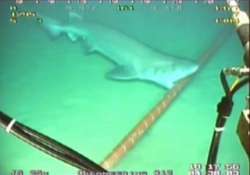Sharks new threat to Google cables underseas
New York: There is a new threat to Google fibre-optic cables at the ocean floor: Sharks.The company has invested in two major undersea cables connecting the western US to Asia, and a third cable that

New York: There is a new threat to Google fibre-optic cables at the ocean floor: Sharks.
The company has invested in two major undersea cables connecting the western US to Asia, and a third cable that extends Google's network within Asia.
Sharks can detect magnetic fields as they have miniature volt sensors in their mouths that they use to detect prey.
"Just a little bite is enough to get through the jacket and damage the fibres," Chris Lowe, a professor who runs shark lab at California State University, Long Beach, was quoted as saying.
Google, however, ensures its cable is sheathed in a Kevlar-like protective coating to keep the sharks from chomping through the line, Network World reported, quoting Google product manager Dan Belcher from a Google marketing event in Boston last week.
In the 1980s, a deep-ocean cable was reportedly cut by crocodile sharks four times.
The company has invested in two major undersea cables connecting the western US to Asia, and a third cable that extends Google's network within Asia.
Sharks can detect magnetic fields as they have miniature volt sensors in their mouths that they use to detect prey.
"Just a little bite is enough to get through the jacket and damage the fibres," Chris Lowe, a professor who runs shark lab at California State University, Long Beach, was quoted as saying.
Google, however, ensures its cable is sheathed in a Kevlar-like protective coating to keep the sharks from chomping through the line, Network World reported, quoting Google product manager Dan Belcher from a Google marketing event in Boston last week.
In the 1980s, a deep-ocean cable was reportedly cut by crocodile sharks four times.